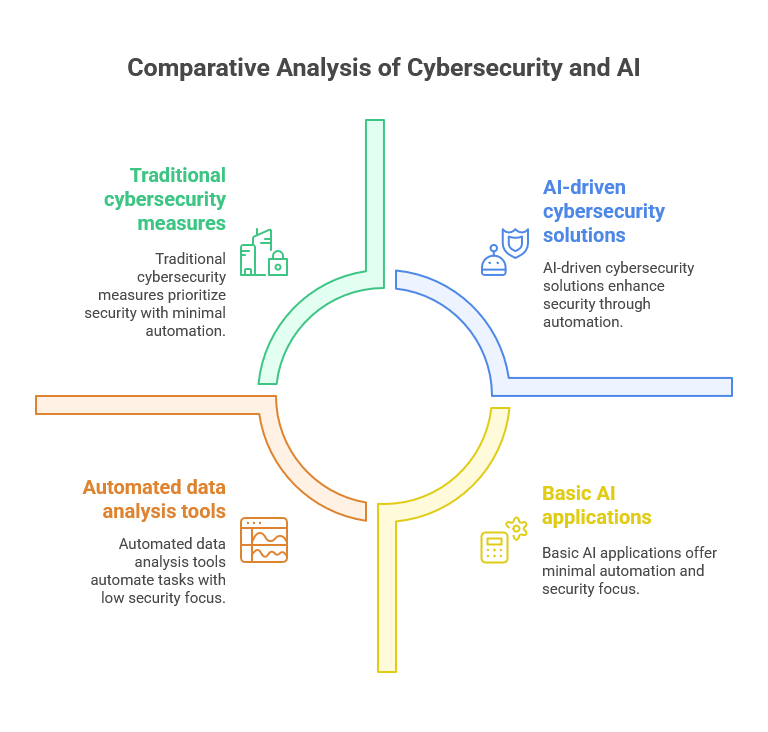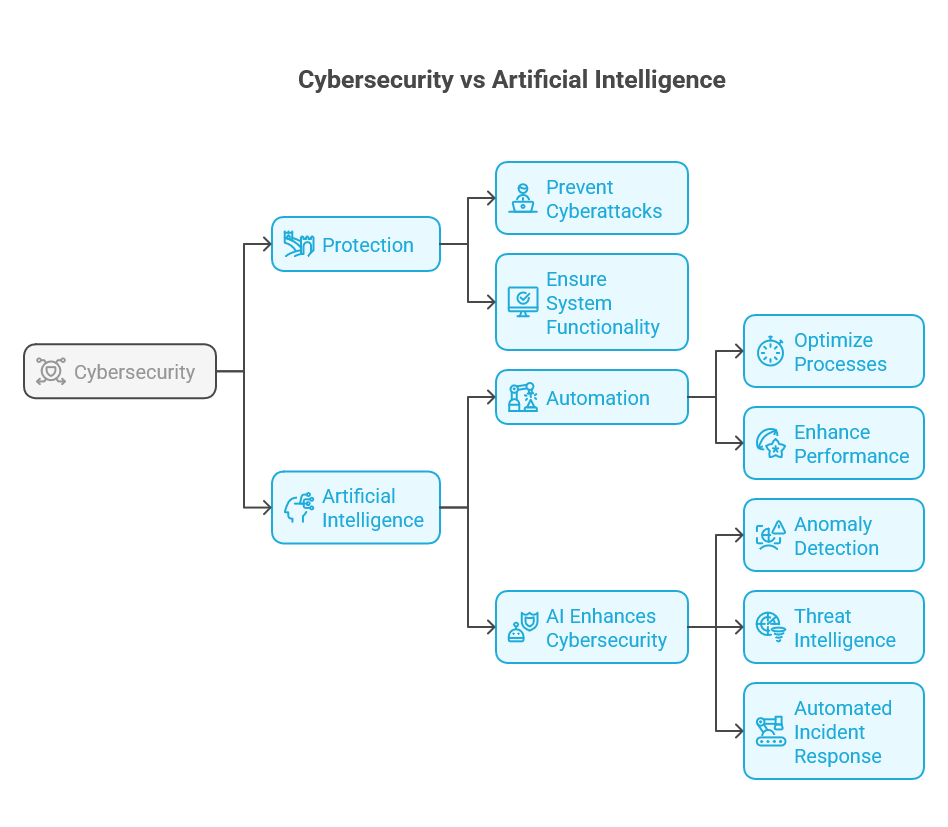Cybersecurity or artificial intelligence are transformative technologies that shape industries, protect data, and enhance our lives. While cybersecurity focuses on securing systems and networks from digital threats, AI automates tasks and improves decision-making. This post, we compare their roles and help you decide which is more critical for your business or personal needs.

What is Cybersecurity?
Cybersecurity refers to the practices, technologies, and processes designed to protect digital systems, networks, and data from unauthorized access, attacks, or damage. As more businesses and individuals rely on the internet for personal and professional needs, the importance of cybersecurity continues to grow.
Why Cybersecurity Matters:
-
Protects Sensitive Information: Cybersecurity ensures that your sensitive data, whether financial, personal, or health-related, is protected from theft or unauthorized access.
-
Prevents Cyberattacks: With the rise of hacking, phishing, ransomware, and malware attacks, cybersecurity serves as a shield against these ever-evolving threats.
-
Business Continuity: A solid cybersecurity system ensures that a business can operate without disruption from cyber incidents, maintaining its reputation and operational efficiency.
-
Compliance: Many industries are legally required to secure personal and customer data, and cybersecurity helps businesses stay compliant with regulations like GDPR or HIPAA.
Cybersecurity Solutions Include:
-
Firewall Protection: Blocking unauthorized access to networks.
-
Data Encryption: Protecting data both in transit and at rest.
-
Network Security: Preventing cyber threats from infiltrating network systems.
-
Incident Response: Plans are in place to quickly respond to cyber incidents and breaches.
According to Cybersecurity Ventures, cybercrime is expected to cost the global economy $10.5 trillion annually by 2025, a massive leap from the $3 trillion figure in 2015. This shows how crucial it is to invest in strong cybersecurity measures.
What is Artificial Intelligence (AI)?
On the other hand, artificial intelligence is the ability of machines to mimic human intelligence. With AI, computers can perform tasks that traditionally require human cognition, such as learning, problem-solving, and decision-making.
AI is often divided into two broad categories:
-
Narrow AI (Weak AI): Designed for specific tasks (e.g., voice assistants like Siri or Alexa).
-
General AI (Strong AI): A more advanced form, capable of understanding, learning, and performing tasks across a wide range of areas like a human.
AI Technologies Include:
-
Machine Learning: Algorithms that learn from data to improve over time without being explicitly programmed.
-
Natural Language Processing (NLP): A branch of AI that enables machines to understand and process human language (e.g., chatbots, translation services).
-
Robotics: AI-driven robots that can perform various tasks autonomously.
-
Predictive Analytics: Using data and algorithms to predict future outcomes or behaviors.
AI is already enhancing performance and efficiency in many industries. It’s used in customer service (chatbots), healthcare (diagnosis), finance (fraud detection), and many other sectors.
Cybersecurity vs Artificial Intelligence: Key Differences
While cybersecurity and AI are essential to modern technology, they are fundamentally different. Let’s break down their roles and importance:
Cybersecurity is all about protection. Its job is to safeguard digital systems and data from external and internal threats. Cybersecurity prevents cyberattacks, data breaches, and theft, ensuring systems remain functional and secure.
Artificial Intelligence, on the other hand, focuses on automation and improvement. It automates tasks, analyzes large data sets, and makes decisions based on patterns or predictions. It’s designed to optimize processes and enhance performance, helping industries function more efficiently.
How AI Enhances Cybersecurity
AI and cybersecurity are not opposing forces but complement each other. Artificial intelligence can significantly enhance cybersecurity efforts, making them more efficient and effective. AI-powered systems can help identify potential threats in real-time, predict attack patterns, and even respond to incidents faster than traditional methods.
Here’s how AI is used in cybersecurity:
-
Anomaly Detection: AI can analyze network traffic to spot unusual behavior that might signal a cyberattack.
-
Threat Intelligence: AI systems can analyze large volumes of data from multiple sources, providing real-time threat intelligence and actionable insights.
-
Automated Incident Response: AI can automatically respond to certain types of threats, such as blocking suspicious IP addresses or quarantining affected systems.

Which One is Better for Your Business?
Now that we understand the differences and roles of cybersecurity and AI, let’s address the burning question: Which is better for your business?
If Data Security is Your Priority, Go for Cybersecurity.
Businesses that handle sensitive information or operate in regulated industries (healthcare, finance, and retail) must prioritize cybersecurity. This will help protect customer data, prevent financial losses, and ensure compliance with legal standards.
For example, if you run an e-commerce site that processes customer payments, cybersecurity measures such as encryption, secure payment gateways, and fraud detection systems are necessary. Without strong cybersecurity, your business could be at risk of data breaches, damaging your reputation, and costing millions of dollars in fines.
If Automation and Data Insights are Your Goals, Go for AI.
On the other hand, if your focus is on improving operational efficiency, AI might be a better choice. AI can automate repetitive tasks, help make data-driven decisions, and enhance customer experiences.
For instance, in marketing, AI can personalize recommendations, segment customers, and automate email campaigns. In customer support, AI-powered chatbots can handle common inquiries, freeing up human agents to tackle more complex issues.
Cybersecurity + AI: The Combined Power
While cybersecurity and AI can be used independently, combined use can create a more powerful system. AI can automate and optimize cybersecurity practices, allowing for more accurate threat detection, faster response times, and less reliance on human intervention.
AI-driven cybersecurity systems can:
-
Automate threat detection: AI algorithms can quickly identify and respond to threats without waiting for human analysts.
-
Detect advanced attacks: AI can learn to recognize and adapt to new attacks more quickly than traditional security methods.
-
Improve incident response: AI can automate responses to known threats, such as blocking malicious IPs or isolating affected systems.
By integrating AI with cybersecurity, organizations can ensure more robust protection against a broader range of cyber threats.
The Future of Cybersecurity and AI
The future of both cybersecurity and AI is bright. As cyber threats evolve and become more sophisticated, AI will play an increasingly important role in protecting digital infrastructures. On the other hand, cybersecurity will continue to evolve, ensuring that the AI systems remain secure from attacks.
Businesses will need both technologies to thrive in the future. AI will improve cybersecurity processes, and cybersecurity will keep AI systems secure from external threats. The two will work hand-in-hand to protect and optimize systems, ensuring businesses function smoothly and securely.
Frequently Asked Questions (FAQ)
1. What is the difference between cybersecurity and artificial intelligence?
-
Cybersecurity is focused on protecting data and systems from cyber threats, while artificial intelligence automates tasks and makes data-driven decisions.
2. Can AI improve cybersecurity?
-
AI enhances cybersecurity by automating threat detection, improving response times, and providing deeper insights into potential threats.
3. What should I choose for my business: cybersecurity or AI?
-
If your main concern is data protection and security, choose cybersecurity. AI is the better choice if you want to automate tasks and use data insights to improve efficiency.
4. How does AI help in cybersecurity?
-
AI detects patterns, identifies anomalies, and automates responses to cyber threats faster than traditional methods.
5. Are cybersecurity and AI essential for all businesses?
-
Yes, both are important. While cybersecurity is critical for protecting data, AI can help businesses become more efficient and competitive.
Authoritative Quotes and Sources:
-
Cybersecurity Ventures: “Cybercrime will cost the world $10.5 trillion annually by 2025,” source
-
Forbes: “AI will enhance efficiency, save time, and drive innovation across industries.” source
Cybersecurity and artificial intelligence are not mutually exclusive in a constantly evolving world. Businesses should adopt both to protect data and drive efficiency. As we look toward the future, combining these two technologies will be key to ensuring a secure and productive digital landscape.
Visit the website for details>>Insecure Web

